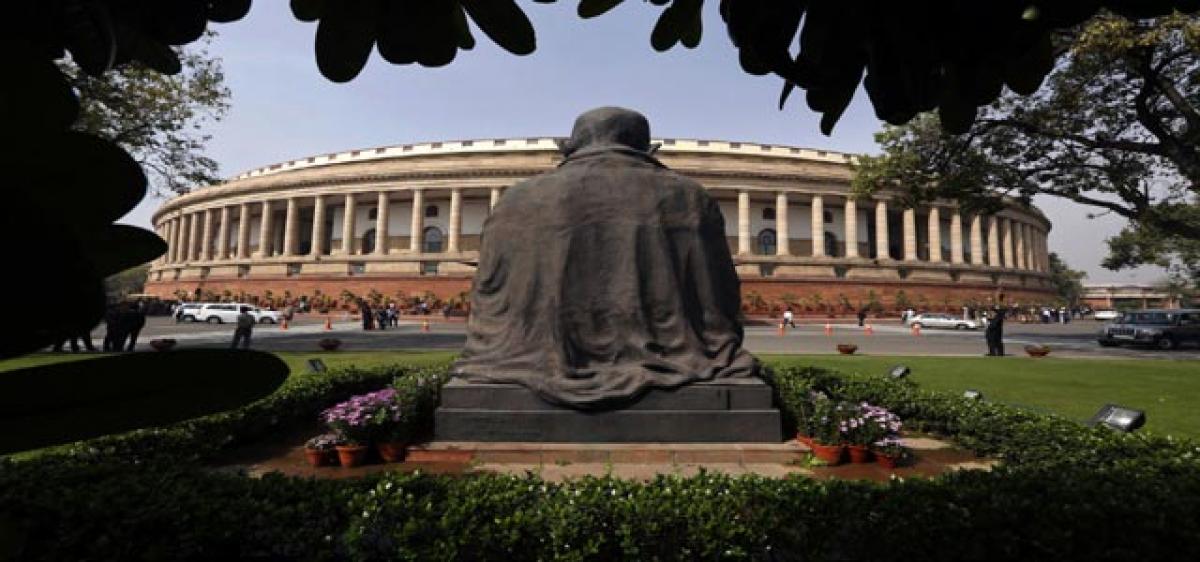Live
- A feast of music, dance and drama
- Mohan Babu denies absconding amid legal controversy
- Swift City to boost industrial growth in Bengaluru
- Allu Arjun walks out free after spending night in jail
- Congress harbours no grudge against any actor: TPCC chief
- Allu Arjun meets Upendra after release from prison, wishes for his ‘UI’ film
- Government Launches Uniform Diet Plan to Boost Student Health and Education
- Robust Security Arrangements for TSPSC Group-2 Exams in Jogulamba Gadwal
- National Lok Adalat Resolves 3387 Cases at Alampur Court
- ‘Get Set, Grow Summit 2024’ Focuses on Digital Detox for Families
Just In

The Winter Session of Parliament being a washout was a foregone conclusion. The Opposition changing its stance on discussion over demonetisation in both the Lok Sabha and the Rajya Sabha too didn’t come as a surprise.
The Winter Session of Parliament being a washout was a foregone conclusion. The Opposition changing its stance on discussion over demonetisation in both the Lok Sabha and the Rajya Sabha too didn’t come as a surprise. There simply wasn’t a cohesive strategy. Their belligerence rubbed off on the Treasury benches and worsened the deadlock.
The exasperated Chairman and the Speaker’s pleas were drowned in the full-throated sloganeering and adjournments became the order of the day, every day. Is it worth even asking leaders of parties and their members to introspect? Rajya Sabha Chairman Ansari’s valedictory address is worth more than a thought.
He stated “I had fervently hoped that I would not have to repeat what I said at the conclusion of 221st Session in December 2010. My hope stands belied. Regular and continuous disruptions characterised the session. The symbolism of dignified protest, so essential for orderly conduct of parliamentary proceedings, was abandoned. This deprived Members of the opportunity to seek accountability of the Executive through Questions and discussions on matters of public interest.
The prohibition in the Rules about shouting slogans, displaying posters and obstructing proceedings by leaving their assigned places, was consistently ignored by all sections of the House.” In the Lok Sabha Speaker Sumitra Mahajan had this to say: “I hope this coming year brings new hope and new energy in our lives and we reflect with resolve that in the New Year we will take conscious decision while using all Parliamentary instruments to forcefully register our dissent and disagreement, if any, and will attempt to ensure less disruptions.”
The anguish is understandable as figures of the number of hours lost in disruption in both Houses is appalling, to say the least. Rajya Sabha lost 86 hours (it sat for 22 hours), whereas the Lok Sabha lost 91 hours and 59 minutes and sat only for 19 hours and 26 minutes. Is it right for the members to claim their attending fees of Rs 2,000? Can rules be changed that this amount be given only if the Houses run smoothly for at least half the day? They earn and the taxpayer feels the pinch.
The other question to be asked is why did the Opposition say one thing at the start and changed later? It started the discussion on ‘notebandi’ on the first day, suspending the business in the Rajya Sabha. 14 members belonging to various parties took part in the discussion, which lasted for over six hours. But the next day, the Opposition sprung a surprise and demanded that Prime Minister Modi must be present during the discussion.
The change in tack was for two obvious reasons. One, the debate pretty much fell flat on the opening day (admitted even by some members privately). Two, the Opposition counterparts in the Lok Sabha were perturbed over their colleagues showing unusual enthusiasm for starting the debate on the very first day.
While the Opposition had its say in bits and pieces on the plight of the common man because of demonetisation, as the Speaker was obliging after saying a no to their adjournment motion, the parties in the Lok Sabha were too disjointed. Members of various parties moved an adjournment motion seeking debate under Rule 56 the first phase. The next phase they ‘showed magnanimity’ and were willing to have the discussion on Rule 184.
However, two parties particularly, the TRS and the BJD wanted discussion under Rule 193 and were willing to start, the moment they got the go-ahead. The BJD had from day one welcomed the scheme and has been seeking a special package from the Centre. Likewise, the TRS doesn’t want to be seen as a hot-headed opposition. But unlike TDP in neighbouring Andhra Pradesh, it is not even an ally. The best option is to be on the right side of the government.
Just two days before the session was ending, they decided to put lung power on hold briefly to pass the long-awaited Rights of Persons with Disabilities Bill, 2014. In the given time, the Rajya Sabha cleared the Bill, with members keeping their points short so that it could be sent to the other House. The Lok Sabha too complied and the Bill was passed in one voice Ayes. At least one part of the electorate was relieved.
Sadly, the camaraderie and rare unanimity that was shown was short lived. Prompting Ansari to say: “Don’t introduce a Jekyll and Hyde personality in the House...we have been functioning well. Let’s continue ...you can’t have two personalities at same time...I fail to understand...” He is certainly not the only one. (INFA)
By Sabina Inderjit

© 2024 Hyderabad Media House Limited/The Hans India. All rights reserved. Powered by hocalwire.com







